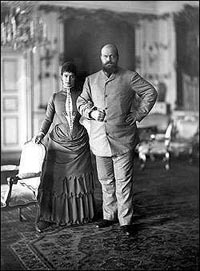Czarina Maria Feodorovna buried in St. Petersburg in pomp-filled ceremony
Cannon shots shook the air, bells tolled and Russians crossed themselves as the remains of Czarina Maria Feodorovna, the Danish-born empress who reportedly longed to return to her adopted homeland, were interred in the Romanovs' royal crypt 78 years after her death.

Maria Feodorovna was the mother of Russia's last czar, Nicholas II, who was executed by the Bolsheviks in 1918. She fled to Denmark in 1919 and died in 1928.
The empress regarded the last decade of her life as exile and wished to be buried in Russia, witnesses said. But she left no written instructions.
Russian and Danish guards placed the wooden casket, covered with a bright yellow flag, near her husband, czar Alexander III, in the royal crypt at the cathedral of the Peter and Paul Fortress on an island in the Neva River, as an orchestra played solemn music. A marble sarcophagus baring Maria Feodorovna's name was then put placed in the cathedral.
"I am very glad that Empress Maria Feodorovna will now again be with her husband and her children ... it's great that they fulfilled the wish of Maria Feodorovna to be buried next to her family," said Alevtina Batalova, a 64-year-old former teacher who came to catch a glimpse of the procession.
Several hundred officials, guests and foreign dignitaries, including members of the British and Danish royal families, attended the burial ceremony, many holding Orthodox prayer candles and white roses and most of them wearing black. Many of the women wore broad-brimmed black mourning hats.
Tatiana Erdman, a great-great-granddaughter of Maria Feodorovna who lives in Colorado, said she was deeply moved by the occasion.
"It's very significant that Maria Feodorovna has finally returned home," Erdman told The Associated Press. "This event is also very meaningful because it gathers the big family of the Romanovs."
The pomp-filled events began earlier Thursday with Orthodox Patriarch Alexy II leading memorial prayers in St. Isaac's Cathedral, the principal church of the Romanov dynasty, reports AP.
Alexy praised Maria Feodorovna as a true daughter of Russia.
"Having fallen deeply in love with the Russian people, the empress devoted a great deal of effort for the benefit of the Russian fatherland," Alexy said. "Her soul ached for Russia."
As the procession moved around the city, people crossed themselves, military officers saluted the cortege, and car drivers blew horns.
Many Russians felt the return of the czarina's remains was a meaningful step in restoring their appreciation of their country's complicated and tormented history.
Subscribe to Pravda.Ru Telegram channel, Facebook, RSS!


